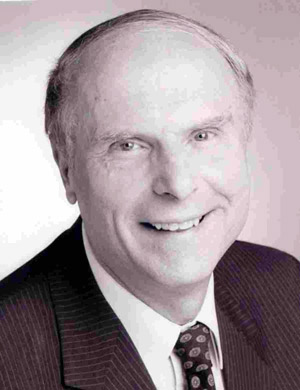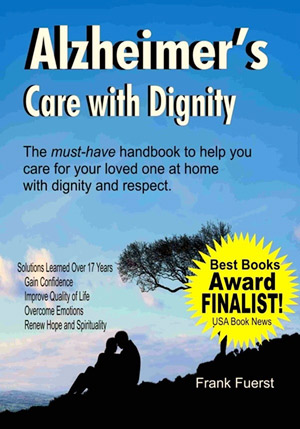News | Profile | Scene
An unbreakable love
Alum who wrote book on wife’s Alzheimer’s to speak in St. Louis this week

Courtesy of Frank Fuerst
Frank Fuerst graduated from Washington University in 1955. A member of Sigma Nu, Lock & Chain and ThurtenE, Fuerst met his match in a student named June, the vice president of Gamma Phi. The two fell in love and dated throughout their four years of college, and six months after graduation, they were married.
It was an impromptu ceremony, as the couple decided to marry on Fuerst’s first leave from the Air Force, giving the soon-to-be Mrs. Fuerst a mere two weeks to plan the wedding. But it went off without a hitch, and the two were married for 45 years, until June’s death in 2000.
While it is a wonderfully romantic story, all was not smooth sailing for the couple: June was diagnosed with an early onset of Alzheimer’s disease at age 50.
During his wife’s 17-year battle, Fuerst cared for her and kept notes on his experiences. His notes, however, were the start of something much bigger than just his story—he turned them into a book titled “Alzheimer’s Care with Dignity”—and now they benefit millions affected by this disease each year.
“I started taking notes just so that I could have all the information I might need right at my fingertips,” said Fuerst. “I wound up with four filed drawers of notes, and I figured someone could really benefit from them. I would say my book kind of wrote itself from the inside out.”
Upon hearing of his wife’s diagnosis, Fuerst resolved to learn all he could about Alzheimer’s and read about 90 books on the disease.
While Fuerst found the books to be educational and informative, he felt something was missing.
“There weren’t a lot of books available that could tell me how to just get through the next day, and there was really nothing available past the first eight years of the disease,” he said. “But June struggled for much longer than that, and I wanted caregivers like me to feel they weren’t alone.”
Fuerst divided his book into what he believes to be the four stages of Alzheimer’s, as experienced by a caregiver: the Independent Phase, the Companionship Phase, the Dependent Phase and the Final Phase.
“I named the first part the Independent Phase because my wife really had to be independent at the beginning,” Fuerst said. “I was still working, so I couldn’t be there all the time.”
“Eventually, though, I felt she was becoming a danger to herself and others,” Fuerst added. “People told me I should give her some restrictions for her own safety, like take away her car. But I didn’t want to take away her independence.”

Courtesy of Frank Fuerst
Fuerst quickly realized, however, that these restrictions were necessary, and the Independent Phase came to an end. The second stage of Alzheimer’s, as Fuerst experienced it, is the Companionship Phase.
Fuerst retired early from his job with IBM to spend all of his time with his wife.
“I just wanted to be with her,” he said. Fuerst decided that it was the time for them to do everything they had ever wanted to do with each other.
“She loved traveling and dining out,” he said, “so we ate out three times a week.” The couple had two favorite restaurants—one Chinese and one Italian—that they visited every week. “The third place was a wild card,” Fuerst said, “so we would try someplace different each week too.”
During this time, the Fuersts also took several trips together; they went everywhere they had always hoped to go—a month in Italy, a tour of America’s national parks, a trip to Canada—but it wasn’t what Fuerst hoped it would be. He said, “She wanted to go to these places, but when we got there, she didn’t have the enthusiasm I knew she would have had. We needed to take advantage of that time, but it just wasn’t the way I had imagined it.”
Fuerst described the next stage, the Dependent Phase, as a period of rapid mental decline. “I entered a pretty bad depression during that period,” he said. “I just felt that every day, there was something new I had to learn. I couldn’t keep up sometimes.”
“She would make things up a lot. I think she just didn’t know what she was saying. She wasn’t aware of her surroundings,” Fuerst said. “Once, a neighbor called the house and asked June where the kids were. She told them they were off bowling, but they were sitting right there at the table. She just didn’t make any sense.”
Friends and doctors often told him about nursing homes.
“I always kind of assumed it was something I would do, put her in a nursing home,” he said. “But I never found the right one for her. I tried nine different homes. Maybe I just never really wanted to let go.”
Fuerst continued to care for his wife from their home until she fell and broke her hip when she had gotten out of bed in the middle of the night.
Mrs. Fuerst stayed in a nursing rehabilitation center until she was able to walk again. “I went to visit her twice a day,” said Fuerst. “This changed everything for me—I helped her with her physical therapy, and I actually made a difference. I could finally help her with something after years of feeling hopeless, like there was nothing I could do for her.”
After this incident, Fuerst dispelled the idea of nursing homes altogether; “It gave me hope,” he said. “After that, I decided to take care of her to the very end.”
The Final Phase is characterized by a period of rapid physical decline. Mrs. Fuerst began to experience seizures and infections—one after another. After a particularly serious seizure, she was hospitalized and went into hospice care, where she was put on a medication that Fuerst believed took away her awareness. “I knew she would die there if I let it continue,” he said, so Fuerst had her released from the hospital and continued to care for her at home.
He explained, “She had an amazing recovery once I brought her back.” However, Mrs. Fuerst died seven months after her release from the hospital, at age 66.
Fuerst was able to come to terms with his wife’s death, as he spent 17 years anticipating it. He dedicated an entire section of his book to preparing for the death of a loved one. “You’re never completely ready for it,” he said.
Fuerst admitted that he still struggles with her death from time to time: “Even today, unresolved issues will come up when I give my talks.”
Besides what to expect from each of the stages of Alzheimer’s, Fuerst also included compilations of useful information for any caregiver.
“I wrote about what I had to go through and how to make sense of things, but the book also has very practical components,” he said. Fuerst included detailed information about medication, doctors, specialists and nursing homes.
From the Fuersts’ nearly lifelong struggle with the disease, others can now benefit from a groundbreaking and truly comforting book.
See Frank Fuerst talk about his experiences and “Alzheimer’s Care with Dignity” in St. Louis this week:
Thursday at 1:30 p.m., Weber Road Library
Thursday at 6 p.m., Buder City Library
Friday at 2 p.m., Indian Trails Library
